
Journal of Environmental Studies and Sciences
Scope & Guideline
Empowering research for a greener tomorrow.
Introduction
Aims and Scopes
- Interdisciplinary Research:
The journal encourages contributions that span multiple disciplines, integrating insights from environmental science, social sciences, economics, and policy-making to address complex environmental issues. - Focus on Sustainability:
Research articles emphasize sustainable practices across various sectors, including agriculture, energy, and urban development, highlighting strategies that promote ecological balance and social equity. - Community Engagement and Participation:
The journal prioritizes studies that involve local communities in environmental decision-making, recognizing the importance of local knowledge and practices in achieving sustainable outcomes. - Climate Change and Environmental Justice:
A significant focus of the journal is on the impacts of climate change and the social justice implications, exploring how marginalized communities are affected and how they can be empowered. - Policy Analysis and Advocacy:
The journal features research that analyzes environmental policies and advocates for effective governance frameworks to address environmental challenges at local, national, and global levels. - Education and Awareness:
A core area of interest is the role of education in fostering environmental awareness and behavior change, particularly through innovative pedagogical approaches.
Trending and Emerging
- Environmental Justice and Equity:
Recent publications increasingly focus on environmental justice, highlighting the disproportionate impacts of environmental degradation on marginalized communities and emphasizing equitable solutions. - Climate Change Adaptation and Resilience:
There is a growing emphasis on research related to adaptation strategies and resilience building in the face of climate change, particularly within vulnerable communities. - Interdisciplinary Education and Pedagogy:
Emerging themes include innovative educational approaches that integrate environmental studies with social justice, equity, and inclusion, fostering a new generation of environmentally aware citizens. - Community-Based Research and Action:
A trend towards community-engaged research is evident, with studies emphasizing participatory methods that empower communities to address environmental challenges collaboratively. - Integration of Technology in Environmental Solutions:
Recent papers explore the role of technology, including data science and digital platforms, in addressing environmental issues and improving public engagement and awareness. - Sustainable Urban Development:
There is an increasing focus on sustainable urban planning and development, exploring how cities can transform to become more resilient and environmentally friendly.
Declining or Waning
- Traditional Environmental Science Approaches:
There seems to be a waning interest in purely scientific studies that do not integrate social or economic perspectives. The journal now favors interdisciplinary approaches that combine science with social sciences. - Focus on Isolated Case Studies:
There is a noticeable decline in publications centered around isolated case studies without broader implications. The journal now emphasizes studies that contribute to larger theoretical frameworks or systemic change. - Narrowly Defined Environmental Issues:
Themes that focus on specific environmental issues without considering their interconnectedness to social, economic, or political contexts are appearing less frequently. - Static Policy Recommendations:
Research offering static policy recommendations without considering dynamic social contexts or stakeholder engagement is becoming less prevalent. The journal now favors adaptive and participatory policy frameworks. - Limited Engagement with Indigenous Knowledge:
There is a reduction in publications that do not incorporate indigenous perspectives or local ecological knowledge, as the journal increasingly values these contributions to environmental understanding.
Similar Journals
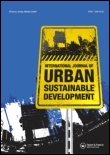
International Journal of Urban Sustainable Development
Shaping policies for a greener, smarter urban landscape.The International Journal of Urban Sustainable Development is a premier peer-reviewed journal published by Taylor & Francis Ltd, dedicated to advancing knowledge in the field of urban sustainability. With an ISSN of 1946-3138 and an E-ISSN of 1946-3146, this journal has gained recognition for its high-quality research, attaining Q1 status in multiple categories including Development, Geography, Planning and Development, and Urban Studies, per the 2023 category quartiles. Open Access since 2022, the journal ensures that groundbreaking research is widely accessible to scholars, practitioners, and policy-makers alike, enhancing its reach and impact. Operating from the United Kingdom, it focuses on a diverse array of topics related to urban environments and sustainable practices, supporting innovation and policy development. As a result, the journal holds significant placements in Scopus rankings, notably ranking #62 in Urban Studies, underscoring its pivotal role in shaping the future of sustainable urban development globally.
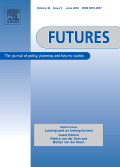
Futures
Advancing Insights for a Changing WorldFutures is a renowned academic journal published by Elsevier Science Ltd, dedicated to advancing the understanding of future studies within a multidisciplinary framework. With a focus on topics spanning business and international management, development, as well as sociology and political science, Futures is ranked in the Q1 quartile for all three categories in 2023, underscoring its pivotal role in fostering innovative discussions and research. The journal, operating since 1968 and set to continue its legacy through 2024, offers a platform for scholars and practitioners to explore critical predictions and emerging trends shaping our global future. Although it is not an open-access journal, its wide circulation ensures a significant reach among academics and professionals keen on exploring the dynamics influencing societal development and strategic planning. By contributing to this esteemed publication, authors have the opportunity to enhance their visibility and engage with a vibrant community committed to transformative knowledge.
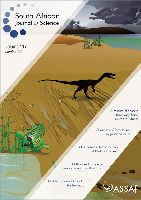
SOUTH AFRICAN JOURNAL OF SCIENCE
Cultivating Interdisciplinary Excellence in ResearchThe SOUTH AFRICAN JOURNAL OF SCIENCE, published by the Academy of Science of South Africa (ASSAf), is a prestigious open-access journal dedicated to the advancement and dissemination of scientific knowledge across various disciplines. Since its inception in 1973, the journal has played a pivotal role in fostering scientific communication within South Africa and beyond, ranking in the Q2 and Q3 quartiles across critical categories such as Agricultural and Biological Sciences, Biochemistry, Genetics and Molecular Biology, and Earth and Planetary Sciences as of 2023. With an ISSN of 0038-2353 and E-ISSN 1996-7489, this journal embraces modern publishing practices, having adopted an open-access model in 2009, which ensures that research is readily accessible to a global audience. The journal aims to promote interdisciplinary research and facilitate collaboration among scientists, making it an essential resource for researchers, professionals, and students eager to contribute to and learn from the dynamic landscape of scientific inquiry. For further information, collaborators and correspondents may reach out to the journal through its contact address: PO BOX 72135, LYNWOOD RIDGE 0040, SOUTH AFRICA.
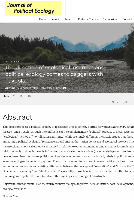
Journal of Political Ecology
Fostering Dialogue on Environmental Justice and PolicyJournal of Political Ecology is a prestigious, open-access publication that has been at the forefront of interdisciplinary scholarship since 1994, hosted by UNIV ARIZONA LIBRARIES in the United States. This journal, identifiable by its ISSN 1073-0451, focuses on critical analyses of environmental issues as they intersect with social and political factors, making it an essential resource for researchers in the fields of Political Science, Geography, and Ecology. As of 2023, it boasts impressive rankings including Q1 in Geography, Planning and Development and Political Science and International Relations, highlighting its significant impact in these categories. Additionally, the journal ranks in the 86th percentile for Political Science and International Relations, further solidifying its position as a leading publication. The convergence of its content from 2011 to 2024 reflects a commitment to exploring contemporary environmental challenges through a political lens, catering to an audience of academics, practitioners, and students. With its strong reputation and commitment to open access, the Journal of Political Ecology is an invaluable platform for advancing scholarly discourse in an increasingly complex and interconnected world.
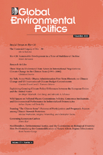
Global Environmental Politics
Advancing Knowledge for Sustainable Global Change.Global Environmental Politics, published by MIT Press, serves as a pivotal platform for interdisciplinary research that intersects the fields of environmental science, political science, and sustainability. Established with the aim to address the most pressing global environmental challenges, this journal has achieved prestigious recognition, placing in the Q1 category across multiple disciplines such as Global and Planetary Change and Political Science and International Relations as of 2023. With an impressive Scopus rank of #23 out of 706 in Political Science and International Relations, it appeals to a diverse audience by publishing high-quality, peer-reviewed articles that contribute to knowledge and policy frameworks essential for promoting sustainability and effective governance. Researchers, professionals, and students engaged in environmental studies will find this journal invaluable for exploring innovative ideas, policy analyses, and case studies designed to foster informed decision-making in an era of rapidly changing ecological and political landscapes. Access to the journal's articles is available through standard subscription options, ensuring that critical research remains accessible to the academic community.

Frontiers in Environmental Science
Exploring innovative solutions to environmental challenges.Frontiers in Environmental Science, published by FRONTIERS MEDIA SA, stands as a pivotal platform in the sphere of environmental research, showcasing innovative findings and interdisciplinary studies that address pressing environmental challenges. With an impressive open access policy since its inception in 2013, it enhances accessibility and promotes knowledge dissemination among researchers, practitioners, and students worldwide. The journal, recognized for its contributions with a Q2 ranking in the Environmental Science category and an engaging position within the 65th percentile on Scopus, provides a comprehensive archive of research that is both timely and relevant. Covering diverse topics from climate change to sustainable resource management, it inspires critical dialogue and fosters collaborative efforts to shape a more sustainable future. Based in Lausanne, Switzerland, this journal invites contributions that advance the field and fulfill its objective of bridging science with practical applications, making it an essential resource for anyone committed to the environmental sciences.

Novos Cadernos NAEA
Empowering interdisciplinary dialogue for a sustainable future.Novos Cadernos NAEA is a prominent open-access journal published by Universidade Federal do Pará, dedicated to advancing the field of applied social sciences and environmental studies. Since its inception in 1998, this journal has established itself as a vital platform for researchers and practitioners to disseminate innovative research, engage in scholarly conversations, and promote interdisciplinary approaches to contemporary issues affecting society and the environment. With an ISSN of 1516-6481 and an E-ISSN of 2179-7536, it aims to enhance accessibility to knowledge by ensuring that all articles are freely available online, thereby supporting the global academic community. The journal's commitment to quality research is evident, making it an essential resource for scholars, students, and policymakers looking for cutting-edge analysis and insights in their fields.
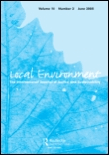
Local Environment
Connecting policy with practice in environmental management.Local Environment is a prestigious academic journal focused on the multifaceted relationships between local environmental changes and global issues, aiming to bridge the gap between policy, community engagement, and sustainable development. Published by ROUTLEDGE JOURNALS, TAYLOR & FRANCIS LTD, this journal has established itself as a leading platform in the fields of geography, planning, and environmental management, boasting an impressive Q1 ranking in Geography, Planning and Development, and a Q2 ranking in Management, Monitoring, Policy and Law for 2023. The journal, with an ISSN of 1354-9839 and E-ISSN 1469-6711, provides an essential resource for researchers, professionals, and students dedicated to exploring innovative approaches to local environmental issues, making significant contributions to both academic scholarship and practical policy implementation. With a commitment to disseminating high-quality research from 1996 to 2024, Local Environment encompasses a wide range of topics crucial for understanding local actions in a global context, further ensuring its relevance and impact in a rapidly changing world.
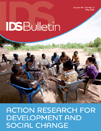
IDS BULLETIN-INSTITUTE OF DEVELOPMENT STUDIES
Advancing knowledge in development and geography since 1976.IDS Bulletin - Institute of Development Studies is a distinguished academic journal focused on the critical domains of development and geography. Published by the Institute of Development Studies, this journal has been pivotal in bridging research and practice since its inception in 1976. As part of its commitment to fostering knowledge that contributes to social and economic progress, the IDS Bulletin is indexed within notable quartiles, attaining Q3 status in both Development and Geography, Planning & Development categories as of 2023. Covering a wide spectrum of topics relevant to contemporary issues, the journal aims to disseminate innovative ideas and empirically-driven insights to researchers, policymakers, and practitioners alike. With its base in the vibrant academic community of the University of Sussex, Brighton, this publication serves as a crucial platform for multidisciplinary discourse, encouraging engagement and collaboration among scholars and field experts. Although not currently offering open access, the IDS Bulletin remains an essential resource for those dedicated to understanding and addressing the complexities of global development challenges.
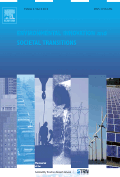
Environmental Innovation and Societal Transitions
Empowering Societal Progress with Environmental InsightsEnvironmental Innovation and Societal Transitions, published by ELSEVIER, stands as a leading academic journal in the fields of Environmental Science, Renewable Energy, and Social Sciences. With an impressive impact factor and ranking in the 98th percentile in Social Sciences and 96th percentile in Environmental Science, this journal is recognized for its rigorous peer-reviewed articles that contribute significantly to the discourse on sustainability and technological advancements. Established in 2011, it embodies the dynamic interplay between environmental innovation and societal adaptation, making it crucial for researchers, professionals, and students dedicated to understanding and shaping sustainable futures. The journal's commitment to high-quality research is evidenced by its placement in the Q1 category across multiple disciplines, asserting its pivotal role in advancing knowledge and practical solutions in these critical areas of study.